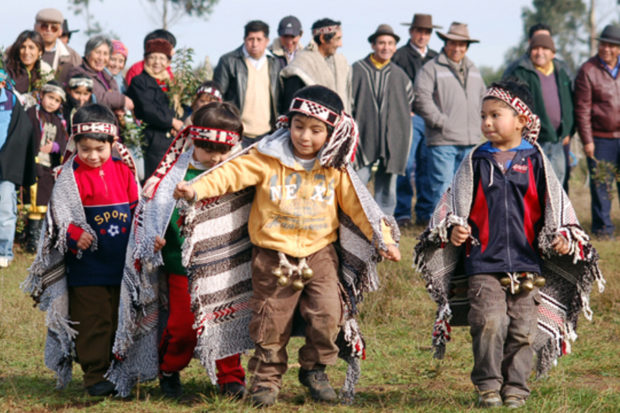
By Juan Trujillo Limones
“It is important to call today to bring out the best in us, the legacy of the grandparents, the traditional knowledge of indigenous peoples for the benefit of all humanity; in a global situation—due to the Covid-19 epidemic—this is a moment in which with solidarity we need to build a better future,” explains the indigenous Mapuche Juan Antonio Calfín, leader of the Intercultural Development Organization of Chile and member of the movement Minga (a community work) by the Pueblos.
The indigenous region of Araucanía already is experiencing the extreme Southern Hemisphere winter. The epidemic reached the region on March 5, and the Mapuche Lafkenche communities of Toltén, in the lower zone, as well as the Mapuche Pehuenche de Curarrehue, located in the Andes, have reacted with notable actions to protect the health of its inhabitants. Also and paradoxically, its community’s autonomy has been strengthened by those actions.
At the initiative of young Mapuche and mestizo residents in the communities and in the cities, they promote the coordination of Minga to support their families. In alliance with organizations such as the Center for Human Rights of the Indigenous Peoples of Chile, the Central University, the Calaucán Indigenous Association, the Ligwen Foundation and the Artisans of Peace Foundation, among others, they have proposed boosting support for 32 communities of the Mapuche region. Through this effort, solidarity baskets and at least 300 boxes with food will be delivered between May and September. In Chile, there are more than 2,000 Mapuche communities whose food is based on flour and yeast to produce bread, wild fruits and lamb and beef meat.

However, since the federal government announced the “health emergency,” the traditional authorities decided to close access to indigenous territory. The shortage of food from the market led the Chilean government to send one box per community, which was insufficient and unleashed the organization of young people.
“We are delivering four or five boxes per community, reaching no more than 5 or 6% of the communities,” explains Calfín, also coordinator for South America of Alianza Milpa.
While in Santiago, the capital of the country, some populations have been confined by the quarantine, there are others organized that live daily without income and generate common pots to share food among homeless people. The winter and the unemployment have further revealed the social inequality of the society. The Minga effort will also try to strengthen the local autonomous market and provide enthusiasm among the organizers.
A social phenomenon of indigenous resilience due to the epidemic resides in the fact that Mapuche youth who were left without work in the cities have returned to their communities: “They are returning to the territories, valuing their legacy, returning to their culture, sowing with their grandparents, chopping wood and valuing that this is the way of living in harmony with Mother Earth.”
Days after the first case by Covid-19 in Chile, in community assemblies, the traditional lonco authorities of the Cautín province decided to close access to communities. Although it was an illegal measure with the winter in the making, “people closed anyways, they made their own sanitary access control, but that caused buses going into towns to stop circulating because the communities did not want people to leave the towns and then come back infected with the virus, thus closing was a way to protect children and elders,” explains local native Francisca Lienlaf.
This decision even had an impact that some indigenous authorities have long sought to implement: the closure of roads to companies that deforest the Araucanian forest. “It always wanted to be done, but it was illegal, however, now we are protected due to this health crisis, based on Agreement 169 of the International Labor Organization regarding autonomy and self-determination in cases of emergency.”
The Mapuche resistance has been belligerent for decades, especially against companies that not only destroy the forest for the commercialization of wood but also historically have stripped the land from the original occupants.
With the communities closed, the Minga intends to generate community bakeries with indigenous volunteers who can sustain themselves with collective clay ovens and barter, and laundries and dryers to serve during the winter season. As part of an ambitious social support plan, the groups will seek to build infrastructure for community connection and support for education.
“We are implementing networks in each community and we are also getting used computers for the community; we are going to manage the Internet plans with a public campaign with antennas to carry the signal.”

The fresh sea breeze fills the Mapuche Lafkenche region. Some of the communities in this low area in Toltén have islands and 50–150 families. The fertile land of this region has allowed the survival of this town for millennia. Marmalades are made from fresh fruits that they sell in bus stops and cities.
La Minga will support its artisanal manufacturing when bottles are scarce in the field. The campaign to collect bottles is already on the works in cities during the quarantine to send them to the families. Faced with Covid-19, the winter and the closure of roads, the collective response gets its strength from those small steps giving hope for its communities.
*****
Juan Trujillo Limones is a journalist and an independent anthropologist. Contact him at xaureme9@outlook.com.
